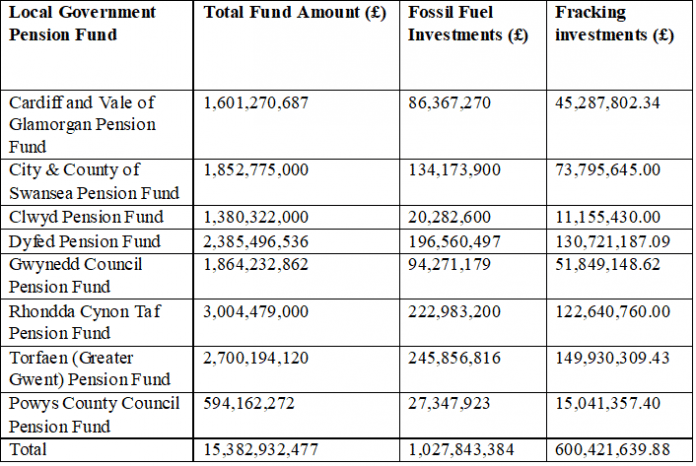Welsh councils invest over £600 million in fracking industry – new report reveals.
Welsh councils are investing over £600 million in fracking companies through their management of local government pension funds, new data released today [3 September] reveals.
The news comes as the fracking industry is poised to frack for gas for the first time in seven years in the UK.
In Wales there is a moratorium on fracking and the Welsh Government are currently consulting on their proposed position not to grant any new licenses for fracking in Wales when the power over these licences is devolved to Wales in October. However, new research reveals that Welsh councils still oversee pension funds investing heavily in companies that have huge global fracking operations.
Companies, in which Welsh councils invest, are fracking in Argentina, USA, Canada, Australia, China and Oman. The companies involved include BP and Royal Dutch Shell. BP has said that it is not fracking in the UK, to avoid ‘the wrong type of attention’ but it has huge fracking operations abroad.
The new report, ‘Divest Fracking; how UK councils are banking on dirty gas’, reveals that:
- Welsh councils invest £600, 421, 640 in fracking companies.
- Greater Gwent (Torfaen) and Dyfed are the Welsh local government pension funds with the highest investment in fracking companies. Greater Gwent and Dyfed invest £149,930,309 and £130,721,187 respectively in fracking companies.
The pension fund investments appear to fly in the face of the Well-being of Future Generations (Wales) Act of 2015, which requires public bodies in Wales to consider environmental and sustainable development in every decision they make. This Act strives to protect future generations from the devastating impacts of climate change and local authorities are accountable to it.
Friends of the Earth Cymru spokesperson Bleddyn Lake said:
“At exactly the same time as the Welsh Government is proposing to effectively kill off any prospects of fracking in Wales, the news that Welsh Local Authority Pension Funds are investing money in companies who continue to frack in other countries around the world is shocking.
“Increasing extreme weather events around the globe show that climate change is really taking hold so we must all do all we can to reduce our climate emissions. These large fossil fuel companies carry on their business as usual approach pushing us ever closer to runaway climate change.
“Welsh councils won’t be faced with fracking applications in their areas when the effective ban on fracking comes into Wales, so they shouldn’t be profiting from fracking in other people’s back yards. We need to see a clear commitment from them to remove all investments, direct or indirect, from fossil fuel companies.
Gareth Ludkin, local divestment campaigner from Fossil Free Cymru commented:
“It’s appalling that Welsh councils are investing local pension funds in the fracking industry. Fracking companies have been linked to human rights abuses and are damaging both communities and local landscapes around the world.”
“Fracking is also opening-up a new frontier of fossil fuels that we cannot afford to burn if we are to avoid catastrophic climate change. Our councils must take a stand against fracking and stop fuelling this dangerous industry through their investments.”
Sakina Sheikh, divestment campaigner with Platform added:
“The devastating fires and record temperatures this summer have brought the impacts of climate change home. Neither local communities nor our climate can afford for the fracking industry to win. Our councils are providing everyday support to the frackers, it’s time to stop. It’s time to divest from fossil fuels.”
The data is released by Platform, Friends of the Earth and 350.org. It ranks UK council-run pension funds by their investments in companies involved in fracking.
In March 2018, Monmouthshire council unanimously voted to pass a motion calling on the Greater Gwent (Torfaen) Pension Fund to divest from fossil fuel companies [4]. Monmouthshire council use the Greater Gwent Pension Fund but the Fund is run by Torfaen County Borough Council who thus have control over whether the Fund divests in practice.
Full divestment commitments have so far been made by two UK local government pension funds, with a further five making partial commitments [6]. The campaign to divest local government pensions has received backing from Unison and the TUC [7]. In addition to the ethical argument for fossil fuel divestment, there is now a financial argument for divestment to protect peoples’ pensions; it is argued that fossil fuel assets will fall in value due to advances in technologies for energy efficiency and renewable power and stronger climate legislation

| [donate]
| Help keep news FREE for our readersSupporting your local community newspaper/online news outlet is crucial now more than ever. If you believe in independent journalism,then consider making a valuable contribution by making a one-time or monthly donation. We operate in rural areas where providing unbiased news can be challenging. |


















